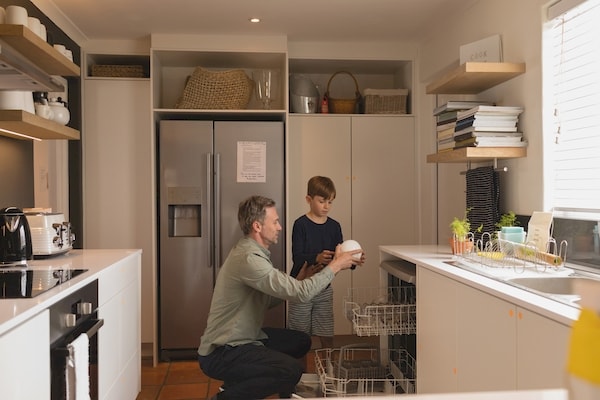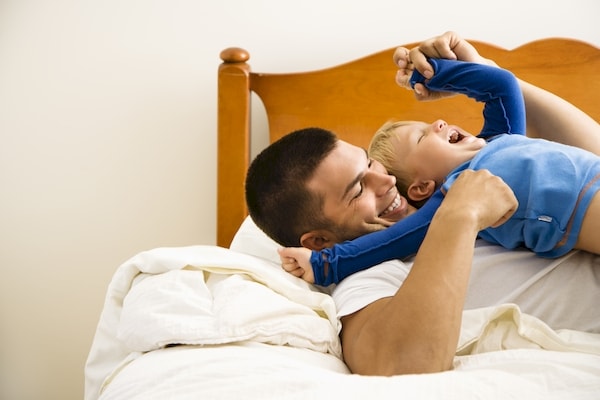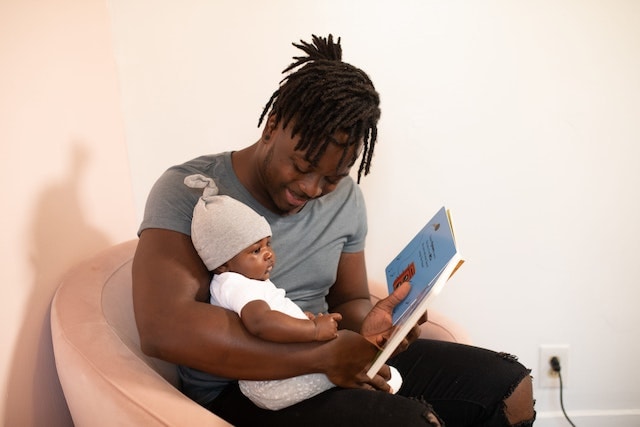Doing It All: Parenting for Modern Dads
Being a Dad is more complex today than ever.
At a recent dinner party, I was chatting about how dads today are way more involved than they were a generation earlier. Unlike my own father, I help with the dishes and housework, take the kids to activities, coach soccer, and have actually changed my share of diapers– while working full-time. My comments provoked an immediate round of eye-rolling among the mothers.
“A father drops the kids off at school, and everyone says, ‘Wow, what an excellent father,'” complained our good friend Janet, a working mom of two. “We mothers get none of that.”
Janet’s spouse, Patrick, caught my eye and arched his brow as if to say, “Dude, you ought to know better than to attempt to speak about how tough it is to be a dad in front of a lot of mothers.”
Later on that night, over beers, the dads gathered to commiserate. Though many had carefully kept their mouth shut throughout my earlier conversation, they shared my beliefs. The typical refrain: Fathers do more than ever, yet our homes seem even crazier than when we were kids. Did all of us have a foggy viewpoint on the past– or is being a dad today genuinely harder than it used to be?
Double Duty
You can definitely see the cultural shift in the way dads are portrayed on tv. By the 1980s and 1990s, the new father was the involved, however kindly, Cliff Huxtable of The Cosby Show. He worked out of a home office and was frequently the first line of parenting.
For many years, the Pew Research Center has tracked how fathers spend their time. Its information backs up the changing image of modern parenting. Beginning in the 1960s, dads started working less overtime, and by 2011 they had actually tripled their time spent looking after the kids and doubled their household chores. (Keep in mind these are averages; some dads do more, some do less.) The typical dad now invests 17 hours weekly on home chores and childcare– about as much as a part-time job. (Moms spend 32 hours.) When you include paid work, fathers log more combined hours than ever before (an overall of 54 hours a week, compared to 53 for moms). Like many moms, fathers come home and work a “2nd shift.”
As a result, the bumbling, inept dad is becoming less of a marketing cliché. Just a few years back, a Huggies commercial got flak for applauding the absorbency of diapers by dissing clueless dads: “We put them to the toughest test imaginable: dads, alone with their children, in one home, for five days.” Nowadays, businesses understand that’s not cool. Instead, advertisements include a dad cleaning his daughter’s princess dress with Tide or using Clorox Clean-Up to handle the mess after a home science experiment.
Many of us accept this new persona– and doing things our own moms used to do doesn’t threaten our masculinity. “Many guys are naturally supporting and now feel totally free to let it show,” says Doyin Richards, a father of 2 young daughters in Los Angeles, who blogs at DaddyDoinWork.com.
Nevertheless, when he did show his own fatherly side, it caused a social-media outcry. While he was on paternity leave, his partner challenged him to put his older daughter’s hair in a ponytail. Richards strapped his baby to his chest, repaired his 2 1/2-year-old’s hair, and captured the minute with a selfie. Within hours, the image went viral, getting nearly 200,000 likes and more than 3,000 comments. Although much of the reaction was positive, he, later on, wrote: “I have a dream that people will view a photo like this and not believe it’s such a huge deal.”
Obstacle Course
Competing demands are complicated. We may want to step it up at home; however, it’s challenging to step back at work. In a Parents study, the number-one reason fathers said they could not spend more time with their kids was that they could not manage to work fewer hours.
Since women earn less than men at every academic level and job classification, it usually makes sense for fathers to work longer hours– but that doesn’t make it proper.
Deep down, many of us do not feel we’re getting the credit we deserve for everything– at least from our partner. The exact same survey found that almost half of dads said their spouse does not value them as much as they want them to.
I can relate. Just recently, my wife had to work late. When she got home, I happily reported that I’d folded the laundry, done the dishes, and put the kids to bed. Eager for recognition, I waited for my share of wifely praise. None came. I made the error of reiterating the list of jobs. My exhausted spouse quipped, “Do you want a medal or a monument?”
There’s an excellent reason for this detachment. While dads have cut back somewhat at work to be at home more, mothers have cut down on household chores and child care for many years. They now invest less time cooking and cleaning. Still, they’re likewise working harder than ever, which explains why the mothers at the dinner party weren’t very supportive of my observations.
The reality is, we’re all feeling stressed since moms and dads together still put in truly long hours at their paid job– more than Europeans and the Japanese. And this takes place with knowing that the United States has no paid maternity or paternity leave. (We rank dead last in work-family policies among industrialized countries.).
Couples have to work together effectively and be adaptable to survive. About a 3rd of the dads in our survey actually do the lion’s share of cleaning and cooking. “I can change the oil in the car and cut wood for the fireplace, but I can also make a killer risotto,” says Matthew Dillion, a dad of three from Niles, Michigan.
Not all couples have a fair balance, of course. And it’s crucial to keep in mind that a quarter of all kids grow up without a male parent in the house. In truth, Pew researchers explain contemporary parenting as a “tale of 2 dads.” While 21 percent of white dads live apart from their kids, 44 percent of African-American fathers and a third of Latino dads do. In these families, fathering might be a very different experience: Only one in 5 dads living outside the home sees his kids more than once a week.
Real Role Models
It’s only now, as an adult, that I can appreciate what my own father did for me. In a thousand little ways, he challenged me to develop and check out the world. Working long hours, he rarely bought things for himself but set an example of altruism. And though he passed away of a chronic illness before my own children were born, his gentle, self-possessed way has formed my parenting style.
At the very same time, I wish we’d been closer. My dad lacked expert flexibility– he never ever made it to parent-teacher conferences. He understood none of my good friends very well. We practically never ever spoke about his childhood. I could not bring myself to ask his advice about my relationships and crushes. And he and my mother had very different interests.
I try to be more present for my kids– I drive them to their soccer games, which I coach, and we small talk in a way my dad and I never ever did. I don’t have the research studies to prove it; however, I think modern parenting is better for our kids and our marital relationships.
If we crave more appreciation for our contributions, we all have the power to help redefine fatherhood. When I asked Lars, a dad of one in Brooklyn, how he and his spouse shared child-rearing obligations, he confidently told me, “She and I are 60-40.” His wife just got home and overheard our phone discussion. “It’s more like 80-20!” she called out. Lars paused and then said, “All I understand is I enjoy being a more involved father.”
No medal or monument is needed.
You May Also Like
Daddy's Role In Effective Parenting
Healthy and wonderful parenting include both mothers and dads …
Single Father by Choice
While many iconic single fathers were thrust into single parenthood …
How Fatherhood Contributes To Fitness And Healthy Living
When it comes to fitness and personal hygiene, most men generally …





